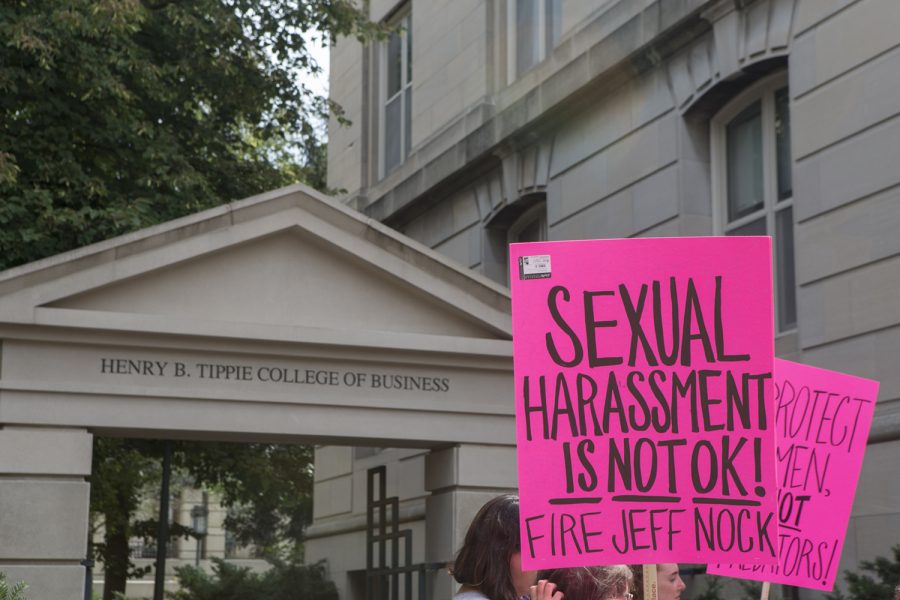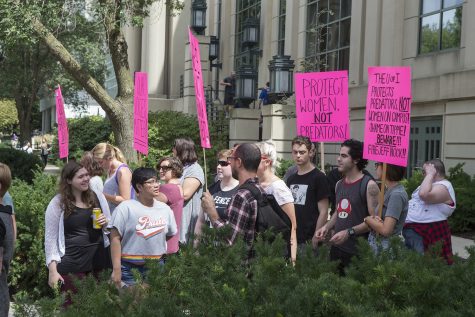Nadler: When is enough, enough?
No “small” report should be taken lightly by the UI administration. Instead they should deter the worst from happening.
A protester holds their sign during the Jeffery Nock protest outside of the Pappajohn Business Building on Aug. 30, 2018. Students and faculty turned out to protest Professor Jeffery B. Nock, who is still employed at the university despite issued a criminal trespass warning after allegedly taking photographs of women at the Campus Recreation and Wellness Center.
September 6, 2018
When is enough, enough?
Where do we draw the line for inappropriate behavior? At what point should the UI administration take small reports against higher-ups at the university and actually do something about them?
In my opinion, all reports should be taken seriously and have some sort of repercussion depending on the action. No student, faculty member, or staff member of the university should feel uncomfortable in the Hawkeye environment because of a lack of judgment by UI officials.
This week, two ridiculous scenarios came to my attention. One concerns a Tippie lecturer, another from a current UI student and a former TA.
In the case of Jeff Nock, a lecturer at the Tippie College of Business, four women came forward to report inappropriate treatment they received from him. Nock only got a small consequence — being banned from the Campus Recreation & Wellness Center for six months. Nock’s punishment did not match the volume of his reported actions toward the women. Instead of being punished further, Nock received a contract renewal and an offer to teach a summer course after the reports were made.
Now, shouldn’t the law protect these people? Under Title IX, a federal civil-rights law, people are protected in a public university from being harassed based on sex. In my opinion, clearly students are not being protected by the law to the extent they deserve.
Poor conduct by people with power is not an isolated event at the UI. I was talking to a current UI student who prefers to remain anonymous, whom I will call Jill. I asked her about struggles she had faced after UI officials did not take her report seriously.
Jill received a low grade for participation from one of her TAs. She went to ask the TA why she had received a low grade, because she believed she had participated exceptionally throughout the semester.
When Jill asked her TA why she was given a low participation grade, the instructor responded, “Because you have the participation level of a parrot or a 2- to 3-year-old child learning how to speak English,” Jill said. The UI took no action.
It irritates me that the Tippie lecturer did not receive a harsher punishment for their tasteless and inappropriate behavior. It aggravates me that the TA Jill was dealing with did not receive any penalty for talking to a student in an extremely degrading way. Jill did not even get a follow-up from the dean of graduate studies — who should monitor such behavior that is reported and communicate with those who report to them.
What do students have to endure for the administration to take such violations seriously? Inappropriate behavior from superiors should not be taken lightly. If anything, these actions should be seen as a precursor to much worse infractions that could pose larger threats to students.
I do not want the UI administration to wait for the worst to happen before they put forth harsher consequences to deter disrespectful and inappropriate behavior. As Hawkeyes, we should always report abuse of power and do our best to make sure we receive justice for such treatment. I wish UI officials would take these matters more seriously.


















